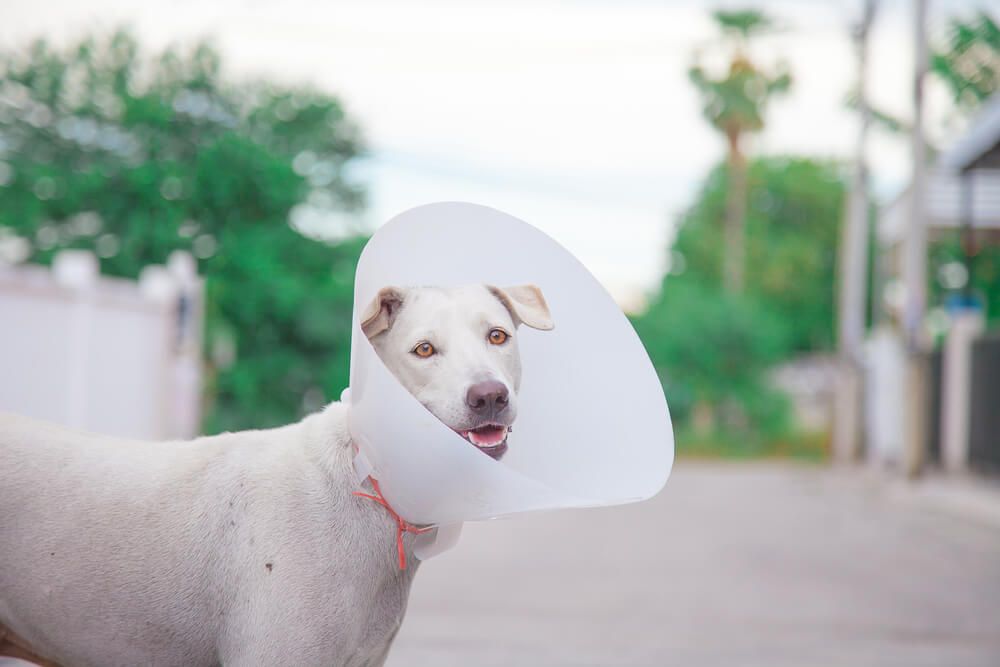Hey Ollie blog readers! We’re offering you an exclusive 60% OFF your starter box! Try now!
There are many reasons why pet parents who aren’t seriously considering breeding their dogs should think about spay or neuter surgery. We looked at all of the pros and cons of spaying and neutering and what you need to know before you schedule your dog’s surgery.
What is spay or neuter surgery?
These terms refer to surgical procedures meant to sterilize your dog and prevent them from having puppies. A spay is the term often used for a surgical procedure called an ovariohysterectomy This is where a vet will remove a female dog’s ovaries and uterus. This can be done through a small incision in the abdomen or laparoscopically.
Neutering refers to castration, or the removal of a male dog’s testicles. It is worth noting that this procedure is less complex than the female spay surgery. In this procedure, the testicles are removed through a small incision in the scrotum. Because spay surgery requires the removal of internal organs, the healing time can be extended compared to neuter surgery.

Pros of spay and neuter surgeries
1. Population control
Having your dog spayed or neutered eliminates the possibility of unplanned pregnancies. A large number of puppies that end up in the shelter system are the result of unplanned litters. Either stray dogs mate and have puppies or pets end up pregnant and if the owners can’t (or don’t want to) find homes for these babies they end up in a shelter or with a rescue. Currently, in the US there are hundreds of thousands of dogs in shelters looking for forever homes. Finding these dogs homes and spaying and neutering dogs so this cycle can’t continue would greatly take the burden off of shelters and decrease the chance of dogs being euthanized due to lack of space.
2. Reduce the risk of certain diseases
For female dogs, there is a reduced (or eliminated) risk of mammary gland tumors, overian tumors, and uterine cancer. This is especially true if the surgery is done before a pup has her first heat cycle. In male dogs, neutering eliminates the risk of testicular cancer and reduces the risk of prostate disease.
3. Helps with some behavioral issues
Dogs who are spayed and neutered are less likely to roam (to find a partner). This leads to a lower risk of escaping and being injured or killed, like being hit by a car because they ran off. In male dogs, neutering also reduces marking, a behavior in which the dog sprays his territory with urine. Neutered male dogs are also less prone to aggression, but research shows that this may only be true in about 30% of cases.
4. Longer life expectancy
Spaying or neutering your dog can increase your dog’s life expectancy by about 1-3 years. This is mostly due to the decreased risk of developing certain cancers. For your dog to live as long and healthy life as possible, it is still important to keep up with vet visits, good nutrition, and adequate exercise.
4. Ensures your dog is allowed to visit dog parks and go to daycare
Some dog parks and daycares (as well as other places where dogs are allowed to socialize off-leash) don’t allow intact dogs to participate. This could be due to the risk of pregnancy, the potential for dogs to fight or become aggressive, or just because they don’t want to clean up after a male dog who is marking. Some spaces will make an exception for dogs who are too young for the procedure, but generally, if your dog is over 6 months they will need to be spayed or neutered to attend.
Cons of spay and neuter surgeries
1. Your dog can’t make puppies
If you decide you want to breed your dog later in life and you’ve already had them spayed or neutered, you won’t be able to breed them.
2. Can cause joint problems if done too early
Heavier mixed-breed dogs have higher health risks if neutered or spayed early, according to a study from researchers at the University of California, Davis. The study found mixed-breed dogs weighing more than 44 pounds as adults are at higher risk for one or more joint disorders if neutered before 1 year of age.
3. Can’t compete in conformation
Conformation is the official term for dog shows. Because the purpose of these shows is to judge how close to the breed standard a dog is, for the purpose of breeding, dogs who are spayed or neutered (as well as mixed breeds) can’t participate.
4. Requires your dog to be put under anesthesia
Having your dog spayed or neutered means they will undergo a surgical procedure, and that requires your dog to be put under anesthesia. There are always risks associated with anesthesia and surgery in general. While in most cases, the benefits of this surgery outweigh the risks, you should make sure your dog is healthy enough to go under anesthesia. Your vet might perform a physical exam prior to surgery to assess your dog’s fitness for surgery.
Should I have my puppy spayed or neutered?
In most cases, the answer to this question is yes. If you aren’t a breeder and don’t have a specific reason to keep your dog intact, it is a good idea to have this surgery performed. If you have your vet perform the procedure expect to pay around a few hundred dollars.
If cost is a concern, there are many low or no-cost clinics across the country that can help. Because unwanted litters of puppies can overwhelm animal shelters, many offer this service as a preventative measure. Check with the SPCA or animal shelter in your area to get more information.
When you adopt a dog from a shelter or rescue, you may be required to have your new pet spayed or neutered before you even welcome them into your home. In other cases, if your pup is especially young, you may be required to sign a contract stating you will have the procedure done when your dog is old enough.
If you have concerns about having your dog spayed or neutered or want to discuss the optimal time to schedule the procedure, chat with your vet. They will know your dog’s health history and be able to make a recommendation for your pup.
The Ollie blog is devoted to helping pet parents lead healthier lives with their pups. If you want to learn more about our fresh, human-grade food, check out MyOllie.com.
Tagged As:

The nutrition your dog needs,
the food they want.

Enjoying our articles? Subscribe our Newsletters and get new articles directly to your inbox
You might also like
18 August 2025
9 MINS READ
Nourish Skin from Within: Fresh Dog Diet Benefits
If your dog is constantly scratching, licking their paws, or has a dull, flaky coat, it’s not just frustrating—it could be a sign that something’s off in their diet. Skin and coat issues are som…
by Ollie Pets
12 August 2025
5 MINS READ
Top 8 Allergens Hiding in Your Dog’s Bowl
As pup parents, we never want to see our dogs uncomfortable. When it comes to itching, swelling, and upset stomachs, the culprit may be in their bowl. Understanding the most common allergens and t…
by Ollie Pets
11 August 2025
5 MINS READ
Not all Processing Is Equal: What’s Really in Your Pet’s Bowl?
As pet parents, we know how important it is that our dogs live long, healthy, and happy lives. This is why at Ollie, we focus so much on what goes into their bowls. But did you know there may be s…







